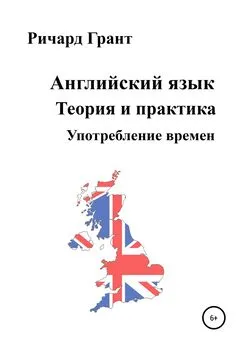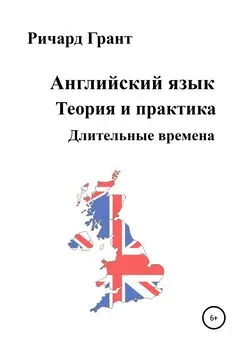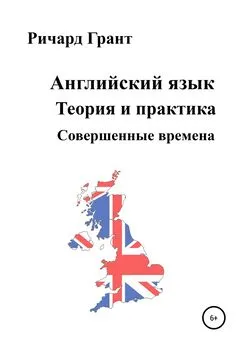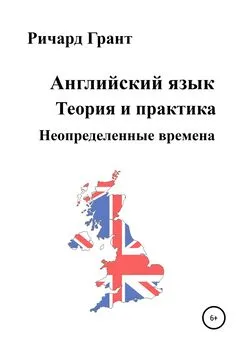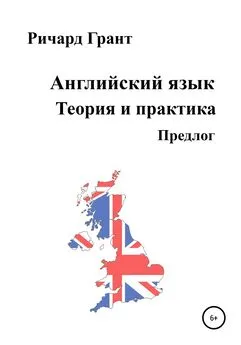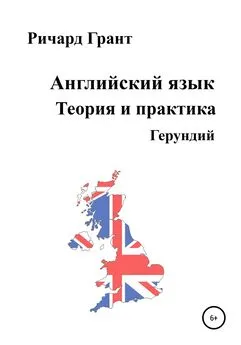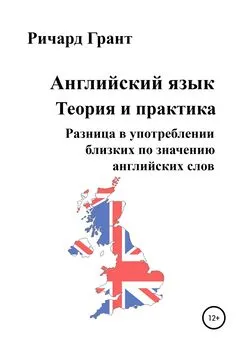Ричард Грант - Английский язык. Теория и практика. Употребление времен
- Название:Английский язык. Теория и практика. Употребление времен
- Автор:
- Жанр:
- Издательство:неизвестно
- Год:2021
- ISBN:978-5-532-95218-8
- Рейтинг:
- Избранное:Добавить в избранное
-
Отзывы:
-
Ваша оценка:
Ричард Грант - Английский язык. Теория и практика. Употребление времен краткое содержание
Освоив теоретический материал, представленный в данной серии, и выполнив более 600 упражнений для самоконтроля, ваш словарный запас будет состоять из более чем 6 000 английских слов и выражений, что позволит вам успешно сдать такие международные экзамены по английскому языку, как TOEFL (Test of English as a Foreign Language), IELTS (International English Language Testing System) и другие.
Английский язык. Теория и практика. Употребление времен - читать онлайн бесплатно ознакомительный отрывок
Интервал:
Закладка:
Did you see a stranger who walked in our street? – Ты видел незнакомца, который прошел по нашей улице? (законченное действие)
2. Past Continuous, в отличие от Past Simple, не используется с глаголами состояния ( stative verbs).
I was knowing knew him for several years. – Я знал его несколько лет .
Обратите внимание на следующие предложения:
When mother came home, I was reading.
came – однократное действие (пришла) – Past Simple
was reading – действие в процессе (читал) – Past Continuous
When mother was reading, I came home.
was reading – действие в процессе (читала) – Past Continuous
came – однократное действие (пришел) – Past Simple
Father was reading at 7 o’clock yesterday. – действие в процессе – Past Continuous
Father came home at 7 o’clock yesterday. – однократное действие – Past Simple
Упражнение 15
Раскройте скобки, употребляя глаголы в Past Simple или Past Continuous.
1. I ( to go) to the cinema yesterday. 2. I ( to play) computer games yesterday. 3. When I ( to come) home, my little sister ( to sleep). 4. The girl ( to cook) dinner when the lights ( to go) out. She ( to burn) herself. 5. I ( to go) to the theatre yesterday. 6. Father ( to watch) TV at ten o’clock yesterday. 7. Last Sunday we ( to go) skiing in the country. There ( to be) already a lot of snow in the fields and we ( to enjoy) ourselves. We ( to ski) for two hours and a half. 8. The cat ( to take) a piece of fish and then ( to run) away. 9. I ( to wash) the dishes after dinner. 10. I ( to feed) my cat with fish yesterday. 11. I ( to go) to the cinema at four o’clock yesterday. 12. I ( to play) computer games at five o’clock yesterday. 13. When Nick ( to come) home, his brother ( to play) with his toys. 14. The boy ( to hurt) himself while he ( to skate).
Упражнение 16
Раскройте скобки , употребляя глаголы в Past Simple или Past Continuous.
1. At seven o’clock yesterday I ( to go) to the theatre. 2. I ( to go) to bed at nine o’clock yesterday. 3. They ( to meet) at the station two hours ago. 4. He ( to read) a newspaper when I ( to come) in. 5. I ( to wash) the dishes from six till seven yesterday. 6. What you ( to do) at four o’clock yesterday? – I ( to feed) my cat. 7. I ( to go) to the cinema when you met me. 8. He ( to play) computer games from two till three yesterday. 9. When mother ( to come) home, I ( to do) my homework. 10. When the woman ( to enter) the room, the children ( to feed) the goldfish. 11. What you ( to do) at 5 o’clock yesterday? – I ( to play) the piano. 12. I ( to finish) my homework at nine o’clock yesterday. 13. Where you ( to spend) last Sunday? 14. Yesterday I ( to get) up at eight o’clock.
Упражнение 17
Раскройте скобки , употребляя глаголы в Past Simple или Past Continuous.
1. She ( to finish) cooking at four o’clock yesterday. 2. What your brother ( to do) yesterday? – He ( to play) computer games. 3. I ( to do) my homework the whole evening yesterday. 4. We ( to play) computer games the whole evening yesterday. 5. When father ( to come) home, Pete ( to sleep). 6. When I ( to visit) my friends in Denmark, I ( to buy) two presents for my family. 7. When I ( to come) to school, the children ( to stand) near the classroom. 8. I ( to play) the piano at five o’clock yesterday. 9. We ( to be) in a hurry because only twenty minutes ( to be) left before the beginning of the performance. 10. The train ( to start) at fifteen minutes to ten. 11. At half past four yesterday we ( to have) dinner. 12. I ( to begin) repairing my camera at six o’clock yesterday. 13. I ( to do) my homework when mother came home. 14. My brother ( not to play) tennis yesterday. He ( to play) tennis the day before yesterday.
Упражнение 18
Раскройте скобки, употребляя глаголы в Past Simple или Past Continuous.
1. When mother ( to come) home, the children ( to play) on the carpet. 2. When it ( to start) raining, we ( to swim) in the river. 3. We ( to play) in the yard the whole evening yesterday. 4. He ( to begin) to do his homework at four o’clock yesterday. 5. I ( to play) the violin when my friend ( to come) in. He ( to invite) me to the theatre and I ( to accept) the invitation with pleasure. 6. He ( to put) on his coat and cap, ( to open) the door and ( to go) out. 7. We ( to work) the whole morning yesterday. 8. At five o’clock yesterday Helen ( to cook) soup. 9. I ( to do) my homework yesterday. 10. My sister ( not to play) the piano at four o’clock yesterday. She ( to play) the piano the whole evening. 11. When I ( to get) up, my mother and father ( to drink) tea. 12. Yesterday at one o’clock I ( to have) lunch at the canteen. 13. When I ( to prepare) breakfast in the morning, I ( to cut) my finger. 14. She ( to play) the flute at four o’clock yesterday.
Упражнение 19
Раскройте скобки , употребляя глаголы в Past Simple или Past Continuous.
1. He ( to ring) up his friend and ( to ask) him about the homework. 2. At this time yesterday I ( to watch) a play by Chekhov at the theatre. 3. Mother ( to cook) dinner at three o’clock yesterday. 4. What you ( to do) when your sister ( to come) home yesterday? 5. I ( to do) my homework from five till eight yesterday. 6. When I came into the kitchen, mother ( to cook). 7. When I ( to come) to my friend’s place, he ( to watch) TV. 8. When he ( to come) in, I ( to do) my exercises. 9. Last year I ( to go) to the United States. 10. I ( to meet) Nick at three o’clock yesterday. 11. When I ( to come) to the theatre, my friend already ( to wait) for me. 12. He ( to come) back to Toronto on the 15th of January. 13. They ( to go) to the wood last Sunday? 14. You ( to have) supper at nine o’clock yesterday?
Упражнение 20
Раскройте скобки , употребляя глаголы в Past Simple или Past Continuous.
1. I ( to do) my homework at six o’clock yesterday. 2. She ( to cook) the whole day yesterday. 3. When I ( to see) my friends, they ( to play) football. 4. What you ( to do) at eight o’clock yesterday? 5. You ( to go) to Great Britain last year? – No, I ( to go) to France. 6. When I ( to come) home, Kate ( to play) the piano. 7. When I ( to go) to the dentist’s, I ( to brеak) my arm. 8. I ( to go) to the institute when I ( to see) him. 9. When they ( to sail) down the river, they ( to see) a little island. 10. He ( not to go) to the shop yesterday. 11. I ( not to play) the piano yesterday. I ( to write) a letter to my friend. 12. We ( to wash) the floor in our flat yesterday. 13. When I ( to open) the door, the cat ( to sit) on the table. 14. At this time yesterday I ( to go) home.
Упражнение 21
Раскройте скобки , употребляя глаголы в Past Simple или Past Continuous.
1. What you ( to do) yesterday? – I ( to translate) a very long article. 2. When I ( to meet) John, he ( to go) to the railway station. 3. When the teacher ( to walk) into the classroom, the boys ( to listen) to pop music and the girls ( to eat) chips and ( to drink) lemonade. 4. At this time yesterday we ( to have) dinner. 5. They ( to translate) a difficult text yesterday. 6. Nick ( to go) to bed at ten o’clock yesterday. 7. I ( not to play) the piano at four o’clock yesterday. I ( to read) a book. 8. We ( to wash) the floor in our flat from three till four yesterday. 9. When Kate ( to open) the door, the children ( to dance) round the fir tree. 10. You ( to sleep) when I ( to go) out. 11. When I ( to ring) up my friend, he ( to sleep). 12. When I ( to go) to the museum, I ( to see) a big crowd of people in the street. 13. She ( to go) to the bank when I ( to meet) her. She ( not to go) to the doctor. 14. He ( to write) a letter when I ( to come) in.
Упражнение 22
Раскройте скобки , употребляя глаголы в Past Simple или Past Continuous.
1. I ( to open) the window at six o’clock yesterday. 2. Rick ( to sleep) at eleven o’clock yesterday. 3. He ( not to sleep) when father came home. He ( to do) his homework. 4. You ( to do) your homework yesterday? 5. When Tom ( to cross) the street, he ( to fall). 6. He ( to read) on the sofa when I ( to come) in and ( to sit) down beside him. 7. While my grandfather ( to watch) TV, he ( to fall) asleep. 8. They ( to play) in the yard in the evening yesterday. 9. What you ( to do) when the accident ( to happen)? – I ( to walk) out of the hospital. 10. He ( to make) a report when I ( to leave) the meeting. 11. You ( to go) to the cinema yesterday? 12. When we ( to play) in the yard yesterday, it suddenly ( to start) raining heavily. 13. When I ( to go) to school the day before yesterday, I met Mike and Pete. They ( to talk) and ( to laugh). They told me a funny story. Soon I ( to laugh), too. I still ( to laugh) when we came to school. After school I ( to tell) this story at home. My father and mother ( to like) it very much. 14. You ( to do) your homework from eight till ten yesterday?
Читать дальшеИнтервал:
Закладка:
